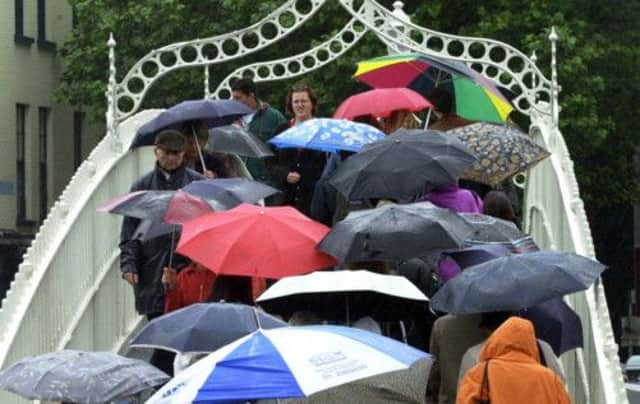Fiona McCade: I got carried away by an apology


Now imagine exactly the same situation, but this time, the man comes up to you and says: “I’m sorry about the rain! Can I borrow your mobile?”
I don’t know whether it helps to fantasise that the man in the second scenario is Hugh Grant, in full, floppy-haired, sweetly stuttering Four Weddings mode, but even if he wasn’t, he got results.
Advertisement
Hide AdAdvertisement
Hide AdPsychologists from Harvard Business School and the University of Pennsylvania devised this little bit of theatre to see how people would react to the completely unrelated apology and they put their findings into a newly published paper, snappily entitled: I’m Sorry About the Rain! Superfluous Apologies Demonstrate Empathic Concern and Increase Trust.
And people did trust the man who pointlessly apologised; much more than when he was simply direct. When he asked straight out, a measly 9 per cent of people lent him their phone. When he began by apologising for something over which he had no control whatsoever, 50 per cent were immediately persuaded to give their mobiles into the care of a complete stranger.
The authors of the study did several other experiments to test their hypothesis and in every case, prefacing a request with an irrelevant apology gave positive results. The apologiser tended to be seen as a good guy.
It would seem that whatever the reason for saying sorry, people like to hear other people say it; even if it’s for absolutely nothing at all. Perhaps it’s because we often associate strength and a sense of justice with the ability to apologise. But in this case, the apology is meaningless, so how come it still has such a strong effect?
I think it’s because those few, extra little words create an important bridge between the people involved in the conversation.
As far as this experiment goes, everybody knows full well that the rain isn’t the guy’s fault, but they obviously understand on a deeper level that he’s pointing it out as a shared experience. He’s saying, look, we’re in this rain together – and while we’re here, can you help me?
I’d like to do a study on how many people would have handed over their phone if he’d simply had the manners to say “please”, but the fact that he was showing some empathy and reaching out beyond the bounds of necessary communication seems to be important here.
Those small touches matter to us; they oil the cogs of everyday interaction and make our meetings with each other a tiny bit more pleasant. As this study shows, they don’t even have to be logical to elicit a positive response. They just have to be there.
Advertisement
Hide AdAdvertisement
Hide AdDespite the Scots’ international reputation for hot-headed belligerence, I’ve always thought that we’re actually very polite, especially when we bump into each other.
Okay, I’ve never bumped into anybody coming out of a nightclub on Sauchiehall Street on a Saturday night, but on the whole, when Scots collide, everybody says sorry, regardless of who actually caused the bump. Unless copious amounts of alcohol have been consumed, there seems to be a permanent knock-for-knock arrangement in place. It’s nice; it makes life easier and happier.
The only worry I have is that unscrupulous people will take note of this research and start firing off apologies, just so the rest of us will think they’re more thoughtful and honourable than they actually are.
However, I think my gullibility would depend on how far removed the subject of the apology was from the object of the request.
If I’d been involved in the Harvard study, I wonder if I’d have found it weird, to have someone apologise for an act of God? Would I have been so suspicious I’d have held on to my phone? What if the man had said something like: “I’m sorry about the invasion of Iraq. Can I borrow your mobile?” And would it have made any difference if that man had been Tony Blair?
To be honest, I’m such a sucker for a “sorry”, however superfluous, I’d probably have handed the guy my ancient phone and said: “Here you go. Sorry it’s so old”.